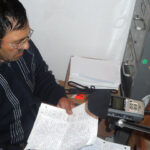
Take a “Trip” Through Europe
August 22, 2023
Middle East Missions … from my perspective
September 5, 2023By Sean Pasley, Missionary to France
Every international missionary’s first priority should be a committed effort towards learning the language of the country they’re going to, so it’s no surprise that for the better part of our two years in France, it has consumed my every waking moment. As a non-missionary you might not have attended a dedicated language school or have a 1000-day streak on Duolingo, but every Christian has had to learn a new language. (And no, I’m not talking about Hebrew and Greek … although you should!)
American Christians have developed a peculiar vernacular that I like to call “Christianese” – a Bible-based adjacent dialect that combines Bible references with folksy wisdom. For example: “In this season of life I’m feeling ‘convicted’ to ‘spread the love of Jesus’ to ‘the nations.” Have your Google Translate app give that one a try.
But while “Christianese” really is only a set of cute expressions that have developed around our shared culture, there can be a danger in using this language. Will anyone outside of your particular church culture circle understand what you’re saying when you’re speaking about the most important subject in the world? If you were to share the gospel with a neighbor, would he or she understand what you mean when you tell them they need to ”invite Jesus into their heart”?
When speaking about eternal things, we should instead use language that the Bible gives us and be able to define it succinctly.
A helpful example of this would be Dr. Clif Johnson’s first message at the 2023 BMA National Meeting. While encouraging every pastor and missionary present that teaching “good doctrine” is not optional, Dr. Johnson blessedly defines what “doctrine” actually means! Doctrine, or “the faith,” in the context of Paul’s epistles to Timothy, is the sound, biblical teaching that has been handed down throughout the ages–the entirety of God’s revelation to man (1 Tim. 1:1-7, 4:6-16, 6:20, 2 Tim. 1:13-14, 3:10, 14-17). If we were to incorrectly define “doctrine” or worse yet, avoid the term altogether for the sake of our Christianese, we would in fact not be teaching what accords with sound doctrine and would be disobeying the command of the Lord. My encouragement to every Christian is to learn the language the Bible uses and to use it regularly yourself.
Unfortunately, there is even a danger in using the right words!
With the ever-looming presence of the Roman Catholic Church here in France, I have spent many hours researching their teachings in order to better understand what the traditionally majority religion of this country believes. Some evangelical scholars will tell you that we have more in common with Rome than we have differences, but that opinion is generally based upon the language we both use. In his book Same Words, Different Worlds Leonardo de Chirico warns that Protestants (this includes us BMA Baptists) must be careful not to fall into the trap of joining with Rome as if we worshiped the same God.
While the language might sound the same, the meanings of key terms could not be more different. A Roman Catholic and a Baptist could both say that we pray to God, but who is this God? How do we pray? Must we pray through an intercessor? Who is it that intercedes for us? All these questions will be answered differently, and the definitions of each of these terms varies wildly depending on who is responding, the Catholic or the Protestant. So as with the world’s languages, there can be false friends (i.e., embarrassed and the Spanish embarazada, which means “pregnant”) and we must work hard not just to agree on the sounds of the language as if we could just pantomime our way through a conversation, but to get the underlying meaning correct in order to actually engage in this new tongue.
That being said, it is every Christian’s responsibility to be a good language learner, not just those in a foreign field. As Baptists, one of our defining characteristics is that we believe the Bible, God’s very Word, to be our sole guide for faith and practice. We let the Bible speak for itself and define its own terms. This is one of the reasons expositional sermons where the point of the text is the point of the message are so vital for developing good Christian doctrine. God has his own language, he defines his own words; and instead of modifying it into a mangled creole, we not only learn the original language but speak it ourselves. So as a final encouragement, with those who are in your care, whether your children or your church, teach them what words like conviction and repentance, and phrases like penal substitutionary atonement, mean according to the source book, because this is the language that will change their lives and set them on the path to real fluency with the Word of God.

